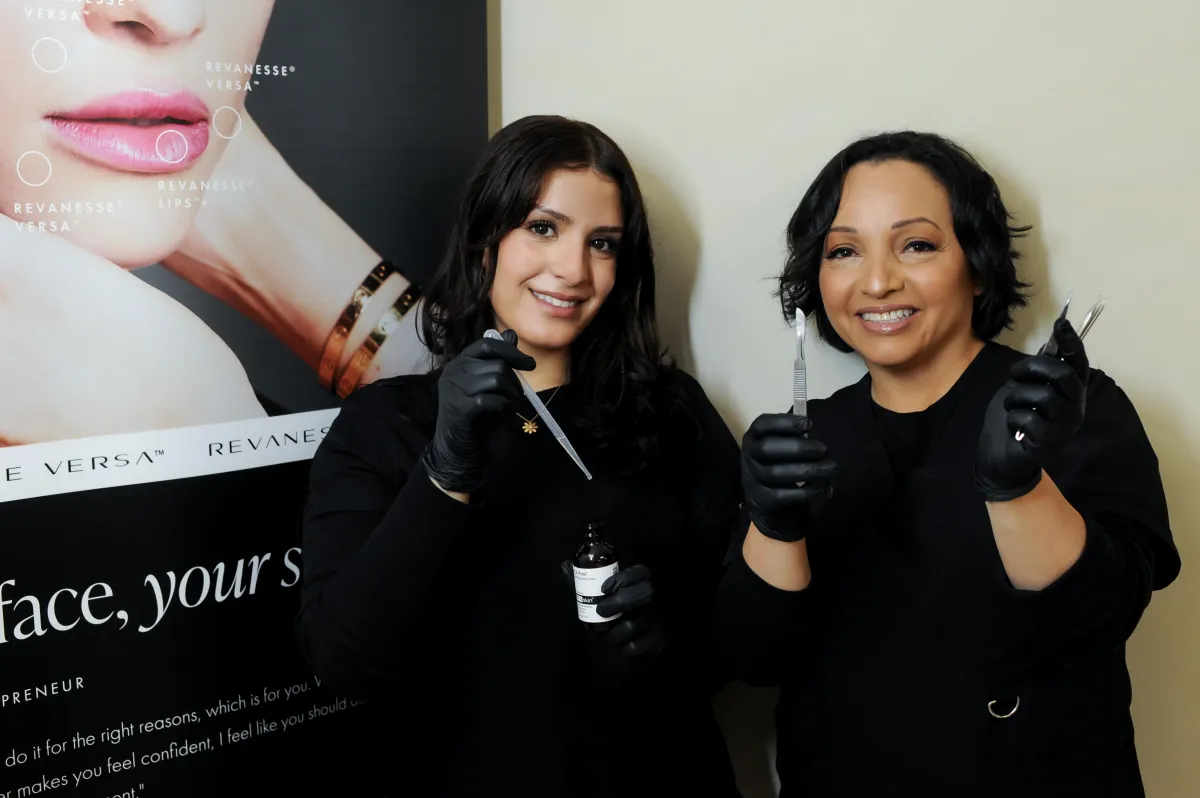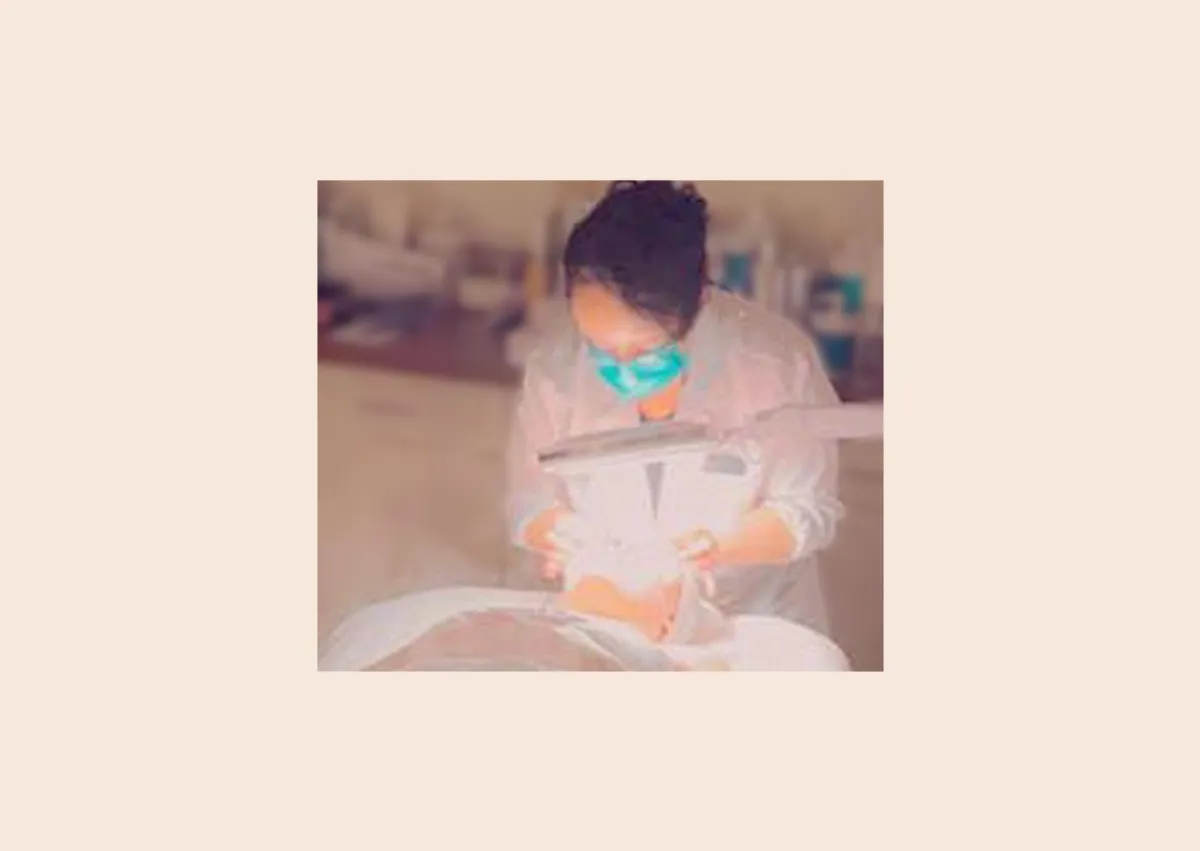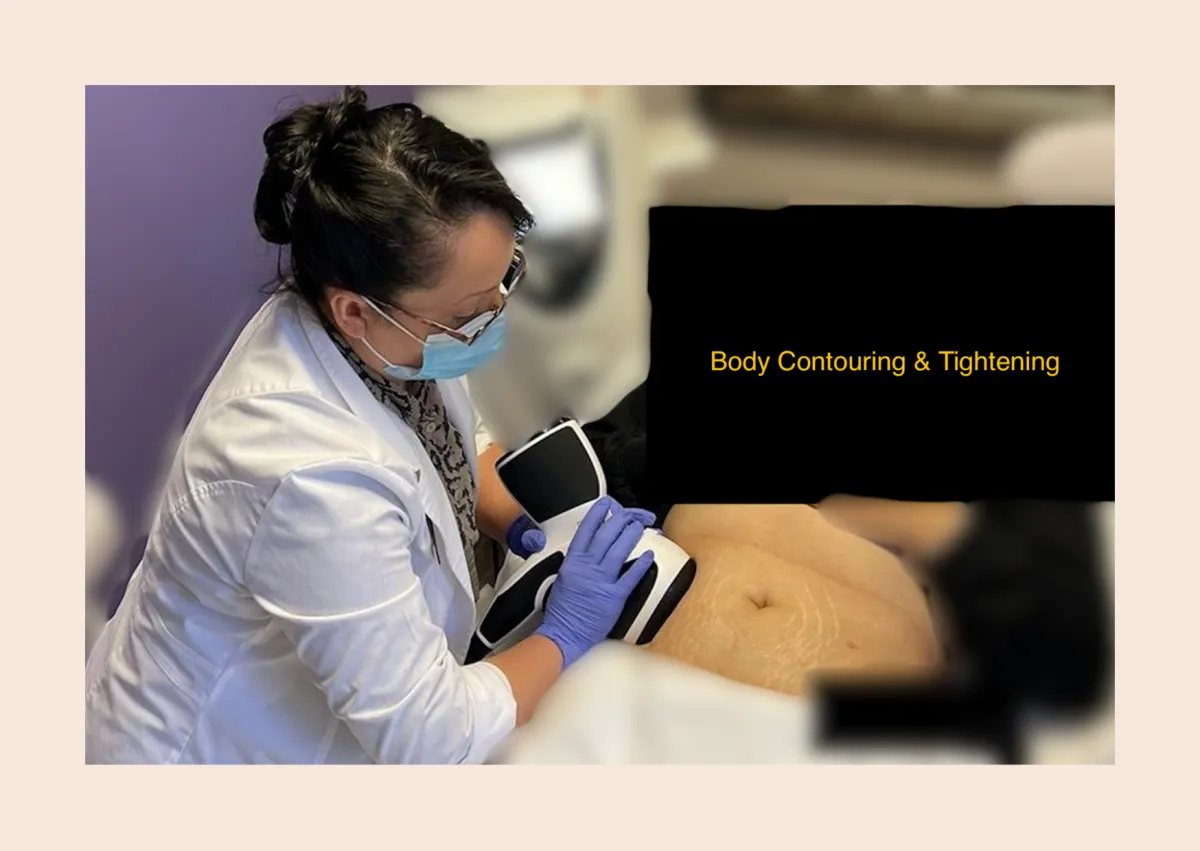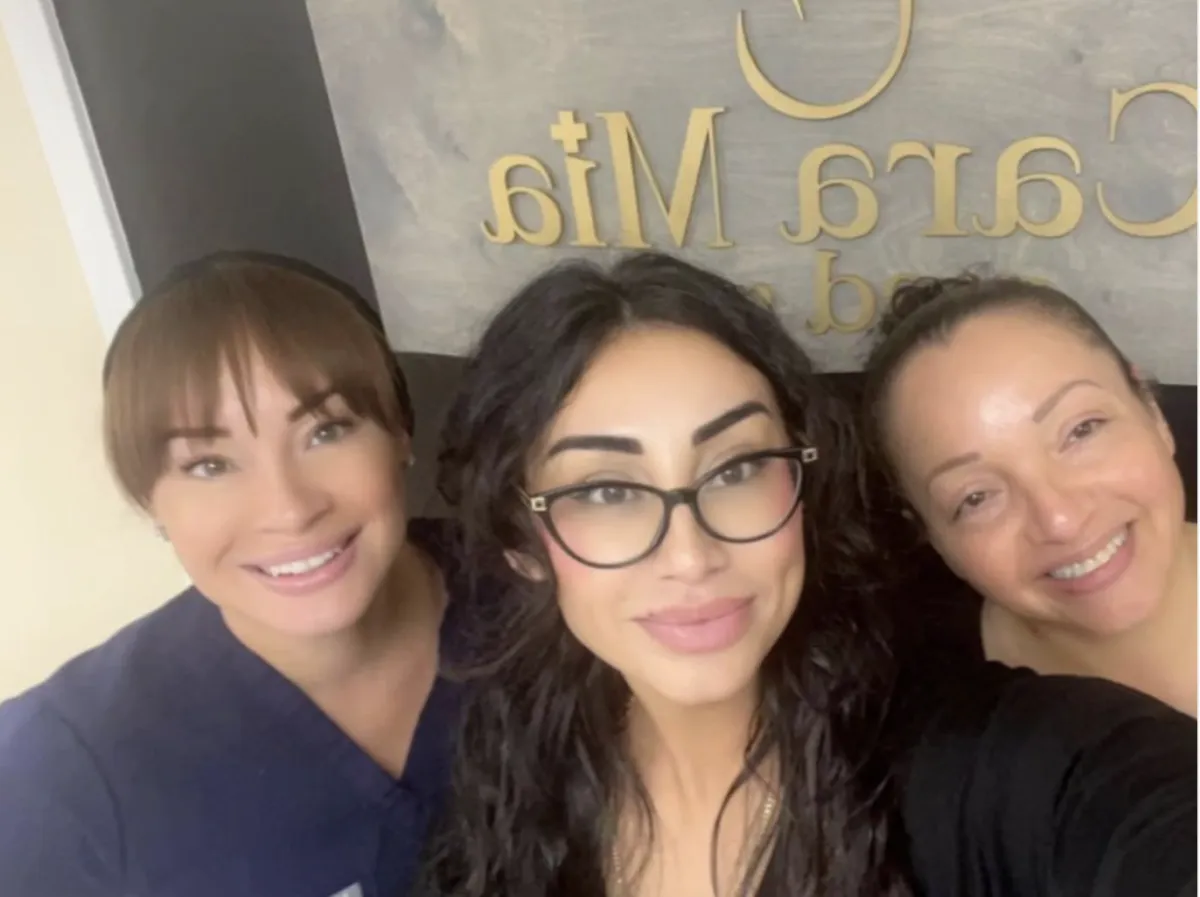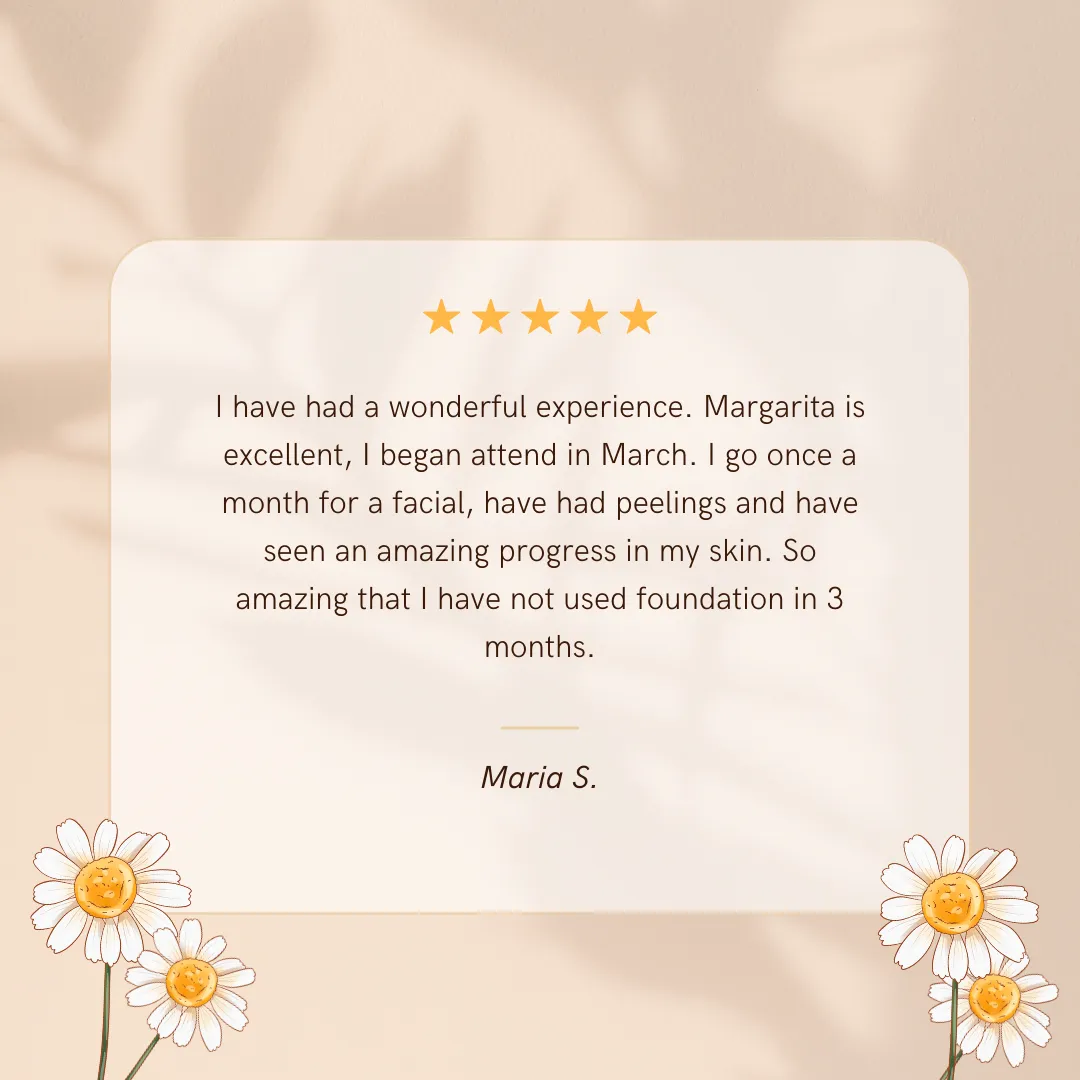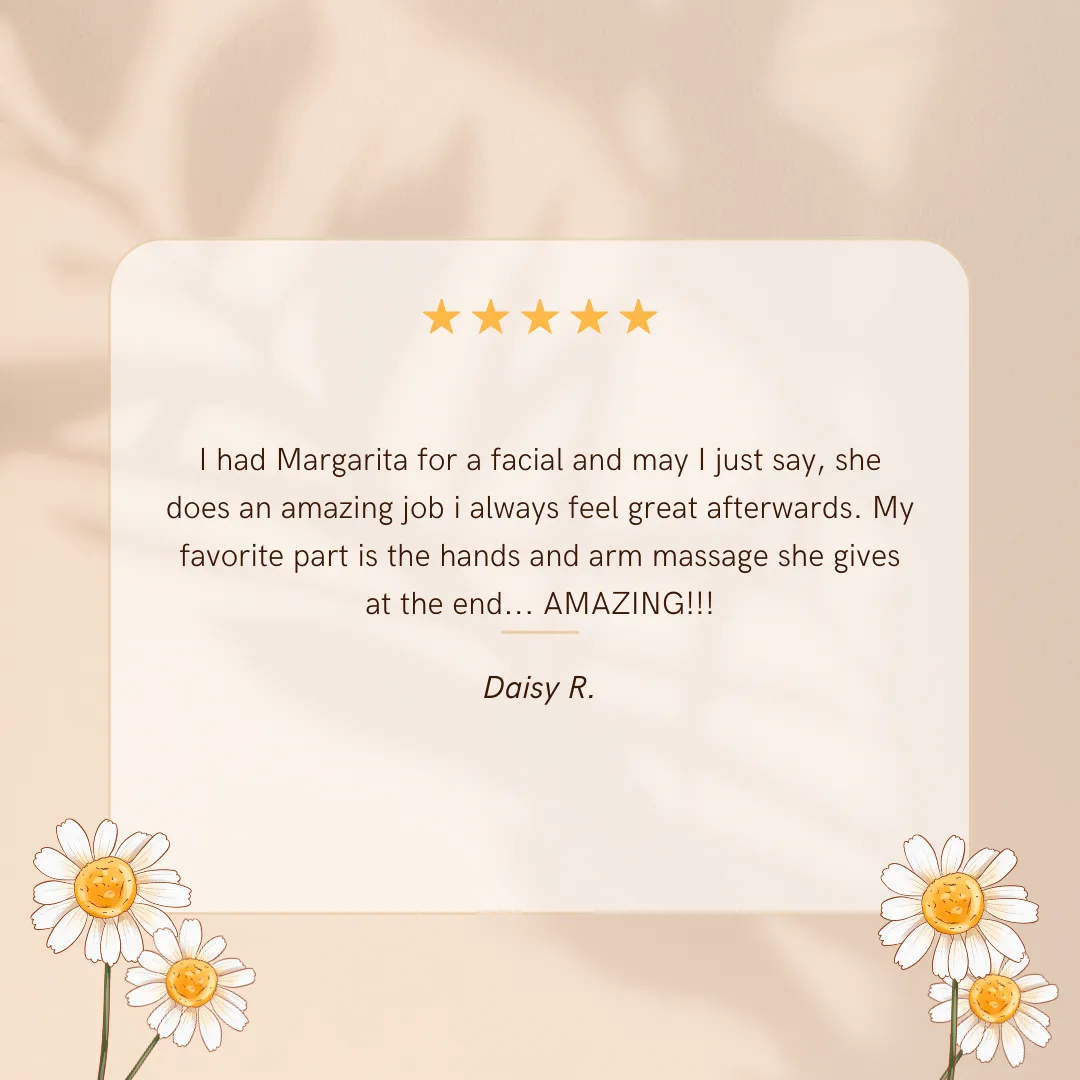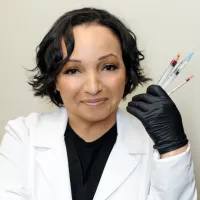(860) 370-5978
Revive Your Natural Beauty With Margarita
Licensed Esthetician in Suffield, CT
Helping you look great and feel confident in your own skin.
SKIN CARE DOESN'T HAVE TO BE STRESSFUL OR COMPLICATED
My approach is to create a personalized treatment plan tailored to your specific needs and goals. Whatever your skincare goals are (to control acne, reduce the effects of aging, help treat rosacea, hyperpigmentation, scar reduction and more...). I'm personally committed to helping you get the results you're looking for.
ADVANCED SKIN CARE TREATMENTS IN SUFFIELD, CT
Margarita provides you with a combination of customized skincare treatments and the most innovative
technologies in Western New England, to help you look great and feel confident in your own skin.
WHY CHOOSE MARGARITA
EDUCATION
Through continued education and training Margarita offers new innovative skin treatments and techniques.
SAFETY & CLEANLINESS
All services are performed to the highest ethical and professional standards, adhering to the strictest health and safety guidelines.
EXPERTISE
Over 24 years of experience performing thousands of professional skin care treatments on thousands of clients.
PRIVACY
Enjoy one-on-one personalized attention in a tranquil and entirely private environment just for you.
KNOWLEDGE
Margarita will come up with customized solutions to meet your specific skin care needs.
RESULTS
Margarita utilizes the latest equipment, tools and non-invasive technologies to bring you immediate visible results.
TESTIMONIALS
BEAUTY TIPS BY MARGARITA
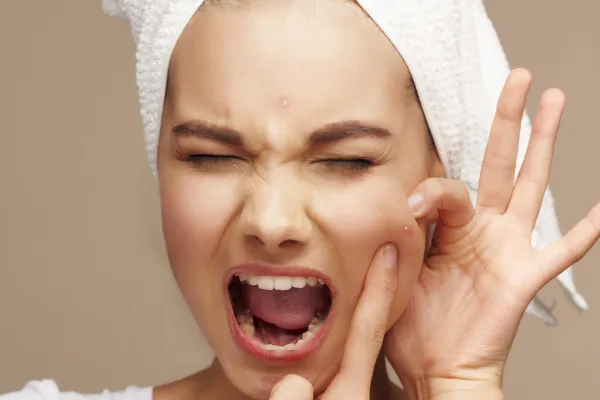
Understanding Acne: Types, Causes, and Effective Treatments for Clear Skin
Understanding Acne: Types, Causes, and Effective Treatments for Clear Skin
Acne is more than just a teenage rite of passage; it’s a common skin condition that affects people of all ages and can significantly impact self-esteem and quality of life. Whether you're dealing with occasional breakouts or persistent, severe acne, understanding the root causes and effective treatments is crucial in achieving clear, healthy skin.

Image by Anastasia Korchagina on Canva.com
In this comprehensive guide, we’ll dive into the different types of acne, explore the myriad factors that can trigger and exacerbate this condition, and highlight proven treatments to help you regain control over your skin. Say goodbye to frustration and hello to a clearer complexion as we unravel the complexities of acne and offer practical solutions tailored to your unique skin needs.
Types of Acne: An Overview
Navigating the world of acne can be as complex as the condition itself. To effectively target and treat your skin concerns, it’s essential to understand the different types of acne and what causes them. Here, we break down the various forms of acne, from the common to the more severe, so you can approach your skincare routine with confidence and knowledge.
Comedonal Acne: The Clog Culprits
Comedonal acne is often the starting point for many acne sufferers. This type involves blackheads and whiteheads, which are essentially clogged hair follicles. Blackheads, or open comedones, appear black due to oxidation when the clogged material is exposed to air. Whiteheads, or closed comedones, remain beneath the skin's surface, giving them a white appearance. Differentiating between these two is crucial for targeted treatment, as each type responds differently to various skincare ingredients.
Inflammatory Acne: The Red Rebels
Characterized by red, swollen pimples, inflammatory acne is a more aggressive form of acne that includes papules, pustules, and nodules. These painful, irritated spots are often caused by bacteria, excess oil production, and dead skin cells leading to inflammation. Papules are small, red bumps that don’t contain pus, while pustules are similar but filled with yellowish pus. Nodules are larger, deeper, and more painful, often requiring more than just over-the-counter treatments to resolve.
Cystic Acne: The Deep Disturbance
Cystic acne is the most severe form of acne, resulting in deep, painful cysts and nodules that form beneath the skin. This type of acne can lead to significant scarring if not treated properly. Cystic acne is often resistant to standard over-the-counter treatments and typically requires more intensive measures, such as prescription medications or even medical procedures. If you’re struggling with cystic acne, consulting a dermatologist is crucial for effective management.
Hormonal Acne: The Fluctuating Foe
Hormonal acne typically makes its unwelcome appearance around the jawline and lower face. This type of acne is closely linked to hormonal fluctuations, such as those occurring during puberty, menstruation, pregnancy, or due to conditions like polycystic ovary syndrome (PCOS). Hormonal acne often requires a multi-faceted approach, combining both topical treatments and systemic therapies to balance the hormonal imbalances at play.
Understanding the type of acne you’re dealing with is the first step toward clearer skin. Armed with this knowledge, you can better navigate the myriad of treatments available and find the most effective strategy to achieve a healthy, glowing complexion. Stay tuned for our next section, where we delve into the causes of acne and how you can proactively prevent breakouts.
Common Causes of Acne
Understanding what causes acne is the first step in effectively treating and preventing it. Acne is a complex condition influenced by various internal and external factors. Here, we delve into some of the most common causes that contribute to those unwelcome breakouts.
Hormonal Changes
Hormonal fluctuations are one of the primary culprits behind acne. These changes are particularly prevalent during puberty, menstruation, and pregnancy. As hormone levels rise and fall, the sebaceous glands in your skin can go into overdrive, producing excess oil. This oil mixes with dead skin cells and bacteria, clogging pores and leading to acne. It's no wonder that teenagers often face acne troubles, but adults aren't immune either—especially women experiencing hormonal shifts during their menstrual cycles or pregnancy.
Diet and Nutrition
“You are what you eat” holds more truth than you might think, especially when it comes to your skin. Studies have shown that diets high in sugar and dairy can exacerbate acne. Foods with a high glycemic index can spike blood sugar levels, leading to increased insulin production and, subsequently, more oil production in the skin. While everyone's skin reacts differently, understanding the relationship between your diet and your skin health can be a game-changer in managing breakouts. Keeping a food diary might help you pinpoint specific triggers and make more informed dietary choices.

Image by Juan Moyano on Canva.com
Genetics
Genetics play a significant role in the development of acne. If your parents or siblings struggled with acne, there's a higher likelihood that you will too. Genetic predisposition can influence various factors like skin type, hormone sensitivity, and the body's inflammatory response—all of which are crucial in the formation of acne. While you can't change your genes, knowing your family's skin history can help you take proactive measures in managing your skin condition.
Stress and Lifestyle Factors
Ever noticed how your skin tends to break out during stressful times? High stress levels can disrupt your hormonal balance, leading to increased oil production and inflammation, both of which contribute to acne. But it's not just stress; lifestyle factors like poor sleep, inadequate skincare routines, and exposure to environmental pollutants can also play a significant role. Ensuring you get enough rest, maintaining a consistent skincare regimen, and minimizing exposure to harmful pollutants can all help in keeping acne at bay.
Understanding these common causes of acne can empower you to take a more targeted approach in your skincare routine. By addressing these factors, you can pave the way for clearer, healthier skin.
Effective Over-the-Counter Treatments
Navigating the world of over-the-counter acne treatments can feel overwhelming, but understanding what each ingredient does can make all the difference in your skincare journey. Here are four powerhouse ingredients that dermatologists frequently recommend for tackling acne:
Salicylic Acid
Salicylic acid is a go-to exfoliant for anyone battling blackheads and whiteheads. This beta hydroxy acid (BHA) penetrates deep into your pores, helping to unclog them by shedding dead skin cells. Its anti-inflammatory properties also work to calm redness and swelling, making it a versatile option for most skin types. Whether you’re using a cleanser, toner, or spot treatment, incorporating salicylic acid into your routine can pave the way for clearer skin.
Benzoyl Peroxide
If bacterial acne is your primary concern, then benzoyl peroxide might just be your new best friend. Known for its potent antibacterial properties, this ingredient targets and kills P. acnes bacteria, the culprits behind many breakouts. Not only does benzoyl peroxide reduce the severity of existing pimples, but it also prevents future breakouts. Available in various concentrations, it’s important to start with a lower percentage to gauge your skin’s tolerance and avoid unnecessary irritation.
Retinoids
Retinoids, derivatives of Vitamin A, are another cornerstone in acne treatment. These compounds accelerate cell turnover, helping to keep pores from clogging while also promoting healthier, rejuvenated skin. Retinoids are particularly effective for treating not just active acne, but also post-acne scars and hyperpigmentation. Moreover, they offer the added benefit of anti-aging properties by reducing fine lines and improving skin texture. Over-the-counter options like retinol can be a great starting point, but always use them under the guidance of a dermatologist to avoid excessive dryness or irritation.
Alpha Hydroxy Acids (AHAs)
Last but certainly not least are Alpha Hydroxy Acids, such as glycolic acid and lactic acid. These water-soluble acids work on the surface of your skin to exfoliate and remove dead skin cells. Regular use of AHAs can result in improved skin texture and tone, as well as a noticeable reduction in the appearance of acne scars. AHAs are also known for their hydrating properties, making them an excellent choice for those with dry or sensitive skin.
Incorporating these key ingredients into your skincare routine can be a game-changer. Remember, consistency is key, and it’s always wise to introduce new products gradually to see how your skin reacts. Clear, glowing skin is within reach with the right over-the-counter treatments!

Image by Kittisak Kaewchalun on Canva.com
Prescription Options for Severe Acne
When over-the-counter treatments fall short in managing severe acne, prescription medications often become the next line of defense. These potent options are tailored to tackle the root causes of acne, providing relief and clearer skin for those struggling with more stubborn forms of this skin condition. Here's a closer look at the most common prescription treatments available:
Oral Antibiotics
Oral antibiotics like doxycycline and minocycline are frequently prescribed for moderate to severe acne due to their ability to reduce inflammation and inhibit bacterial growth. These medications target the bacteria (Propionibacterium acnes) that contribute to acne development. By decreasing bacterial populations and mitigating inflammatory responses, oral antibiotics can significantly improve acne symptoms. However, they are typically used for a limited duration to minimize the risk of antibiotic resistance and are often combined with topical treatments for a more comprehensive approach.
Hormonal Treatments
For many women, hormonal fluctuations can be a significant factor in acne development. Hormonal treatments, such as birth control pills and antiandrogens like spironolactone, work by regulating hormone levels that influence oil production in the skin. Birth control pills help stabilize estrogen and progesterone levels, while spironolactone reduces androgen levels, which can decrease oil production and, consequently, acne. These treatments are particularly effective for women who experience acne flare-ups in conjunction with their menstrual cycle or have other signs of hormonal imbalance.
Isotretinoin (Accutane)
Isotretinoin, commonly known by its brand name Accutane, is a powerful oral medication reserved for severe, cystic acne that has not responded to other treatments. It works by dramatically reducing the size of the skin’s oil glands, decreasing oil production, and altering the skin’s environment to make it less hospitable for acne-causing bacteria. While isotretinoin is highly effective, it comes with a range of potential side effects, including dry skin, joint pain, and, more seriously, birth defects if taken during pregnancy. Therefore, it requires close medical supervision, regular blood tests, and adherence to strict guidelines, including the iPLEDGE program in the United States.
Topical Prescription Medications
Topical treatments remain a cornerstone in the fight against severe acne. Prescription retinoids like tretinoin work by promoting cell turnover and preventing clogged pores, while topical antibiotics such as clindamycin target and eradicate acne-causing bacteria. These treatments help reduce inflammation and prevent future breakouts. The combination of retinoids and antibiotics can be particularly effective, providing a dual-action approach that addresses multiple aspects of acne formation.
Navigating the world of prescription acne treatments can be daunting, but understanding these options is a critical step toward achieving clear skin. Always consult with a dermatologist to determine the best treatment plan tailored to your specific needs and skin type. With the right approach, even severe acne can become a manageable condition, paving the way for healthier, clearer skin.
Lifestyle Changes to Prevent Acne

Image by Nathan Cowley on Canva.com
When it comes to combating acne, lifestyle choices play a crucial role in determining the health and clarity of your skin. Here are some key adjustments you can make to your daily routine to help prevent those unwelcome breakouts.
Dietary Adjustments
Ever wondered if what's on your plate is affecting your complexion? It turns out that certain foods, particularly those high in sugar and dairy, can trigger acne breakouts. Sugary snacks and beverages can spike your insulin levels, leading to increased oil production and clogged pores. Similarly, dairy products have been linked to hormone fluctuations that can exacerbate acne.
Instead, opt for a balanced diet rich in fruits, vegetables, and whole grains. These foods are packed with essential vitamins and antioxidants that promote healthy skin. Foods high in omega-3 fatty acids, like salmon and walnuts, can also help reduce inflammation and keep your skin clear.
Skincare Routine
A consistent skincare routine is your first line of defense against acne. Begin with gentle cleansing to remove dirt, oil, and makeup without stripping your skin of its natural moisture. Follow up with regular exfoliation to slough off dead skin cells, helping to keep your pores unclogged. Lastly, don’t forget to moisturize. Even oily skin needs hydration to maintain a healthy barrier.
When choosing skincare products, look for labels that say “noncomedogenic,” meaning they won’t clog your pores. Ingredients like salicylic acid, benzoyl peroxide, and tea tree oil can be particularly effective in keeping acne at bay.
Stress Management
Did you know that stress can literally show up on your face? When you’re stressed, your body produces cortisol and other hormones that can trigger acne. Managing stress is therefore a vital part of any acne prevention strategy.
Consider incorporating mindfulness practices such as meditation or yoga into your daily routine. Exercise is another excellent stress-buster that also improves circulation, bringing more oxygen and nutrients to your skin. Finally, make sure you’re getting enough sleep, as adequate rest helps regulate hormone levels and promotes skin repair.
Hydration and Exercise
Staying hydrated is more than just a health tip; it’s a skin-care essential. Drinking enough water helps flush out toxins from your body and keeps your skin hydrated and supple. Aim for at least eight glasses a day and consider increasing your intake if you’re physically active.
Speaking of activity, regular exercise does wonders for your skin. It improves blood circulation, which helps nourish skin cells and keeps them vital. Plus, the endorphins released during exercise can reduce stress, leading to fewer breakouts.
By making these lifestyle changes, you can take significant strides toward achieving clearer, healthier skin. Remember, consistency is key. A balanced diet, a solid skincare routine, effective stress management, and staying hydrated and active are all part of a holistic approach to preventing acne and enjoying the radiant skin you deserve.
Home Remedies and Natural Treatments
Diet and Nutrition:
When it comes to acne, the age-old saying "you are what you eat" holds a significant amount of truth. While diet alone isn't the sole culprit for acne, certain foods can trigger or exacerbate breakouts. Incorporating a balanced diet rich in vitamins and minerals can make a noticeable difference in your skin's clarity.
Focus on eating foods high in antioxidants, such as berries, leafy greens, and nuts. Omega-3 fatty acids, found in fish like salmon and flaxseeds, can help reduce inflammation, a key factor in acne. Additionally, cutting down on sugar and refined carbohydrates can stabilize insulin levels, which may help mitigate acne flare-ups.

Image by marrakeshh on Canva.com
Herbal Remedies:
Mother Nature offers an abundance of herbal remedies that can be effective in managing acne. Tea tree oil, known for its antimicrobial properties, can be a potent topical treatment to reduce acne-causing bacteria. Aloe vera, another versatile plant, is excellent for soothing irritated skin and reducing redness. Green tea, rich in antioxidants, can be used both topically and consumed as a drink to help fight inflammation and bacteria. Keep in mind that while herbal remedies can be beneficial, it's crucial to do a patch test first to ensure you don't have any adverse reactions.
Lifestyle Changes:
Our daily habits and lifestyle choices play a significant role in the health of our skin. Stress, lack of sleep, and inadequate hydration can all contribute to acne. Practicing stress-reducing activities such as yoga, meditation, or even simple breathing exercises can help manage stress levels. Aim for at least 7-8 hours of quality sleep each night to allow your skin the time it needs to repair and rejuvenate. And, of course, staying hydrated by drinking plenty of water throughout the day helps to flush out toxins and keep your skin looking fresh and clear.
Skincare Routine:
Establishing a consistent and effective skincare routine is paramount in managing acne. Begin with a gentle cleanser to remove dirt, oil, and makeup without stripping your skin of its natural oils. Follow up with a toner to balance your skin's pH levels. Incorporate serums that contain acne-fighting ingredients like salicylic acid or benzoyl peroxide. Moisturizing is crucial, even for oily or acne-prone skin, as it helps maintain the skin barrier. Choose a non-comedogenic moisturizer to prevent clogged pores. Lastly, never skip sunscreen. Opt for a broad-spectrum SPF that is oil-free and designed for sensitive or acne-prone skin to protect against harmful UV rays.
By integrating these home remedies and natural treatments into your daily routine, you not only take steps toward clearer skin but also embrace a holistic approach to overall well-being. Remember, consistency is key, and while natural treatments may take time to show results, their benefits often extend beyond just treating acne.
The Role of Diet in Acne Management
When it comes to managing acne, what you put on your skin is only part of the equation. What you feed your body plays a significant role in the health of your skin. Understanding the connection between diet and acne can empower you to make better food choices that contribute to clearer, healthier skin. Let's delve into how dietary triggers, anti-inflammatory foods, hydration, and essential vitamins and minerals can impact your skin’s condition.
Dietary Triggers and Acne Breakouts
Certain foods can act as triggers for acne flareups, and understanding these can help you avoid or minimize breakouts. High-glycemic-index foods, such as white bread, sugary cereals, and soda, cause rapid spikes in blood sugar levels, which can lead to increased sebum production and clogged pores. Dairy products, particularly skim milk, have been linked to acne due to their hormone content which can stimulate oil glands. Additionally, foods high in refined sugars, like pastries and candies, can exacerbate inflammation and worsen acne symptoms. By identifying and reducing your intake of these common dietary culprits, you can take a proactive step towards managing your acne.
Anti-Inflammatory Foods for Clearer Skin

Image by bit245 on Canva.com
On the flip side, incorporating anti-inflammatory foods into your diet can have a positive impact on your skin. Fatty fish, such as salmon and mackerel, are rich in omega-3 fatty acids, which have been shown to reduce inflammation and may help keep acne in check. Leafy greens like spinach and kale are packed with antioxidants that protect the skin from oxidative stress. Nuts and seeds, particularly those high in selenium and zinc, can support skin repair and reduce inflammation. Berries, rich in vitamins and antioxidants, can also help combat skin inflammation. By making these anti-inflammatory foods a regular part of your diet, you can support your skin’s health from the inside out.
The Impact of Hydration
Never underestimate the power of hydration when it comes to maintaining clear skin. Staying well-hydrated helps your body flush out toxins that can contribute to acne. Drinking adequate amounts of water keeps your skin moisturized and resilient, which is essential for maintaining its natural barrier against bacteria and pollutants. Aim for at least 8 glasses of water a day, and consider incorporating hydrating foods like cucumbers, watermelon, and oranges into your diet for an extra hydration boost.
The Role of Vitamins and Minerals
Finally, essential vitamins and minerals play a crucial role in supporting skin health and can potentially reduce acne. Zinc, an essential mineral, has anti-inflammatory properties and can help regulate oil production. Foods rich in zinc include oysters, beef, and pumpkin seeds. Vitamin A, found in foods like sweet potatoes and carrots, aids in skin cell turnover and repair. Omega-3 fatty acids, found in fatty fish and flaxseeds, help reduce inflammation and may diminish the severity of acne. Ensuring you get a balanced intake of these vital nutrients can provide your skin with the support it needs to stay clear and healthy.
In conclusion, while there is no one-size-fits-all diet for everyone struggling with acne, being mindful of what you eat can make a significant difference. By avoiding dietary triggers, embracing anti-inflammatory foods, staying hydrated, and ensuring an adequate intake of essential vitamins and minerals, you can take meaningful steps towards achieving clearer and healthier skin.
How to Develop a Skincare Routine for Acne-Prone Skin
Creating a skincare routine tailored to acne-prone skin can feel like navigating a minefield. However, with the right approach, you can achieve a clearer, healthier complexion. Here’s a step-by-step guide to help you develop a skincare regimen that addresses acne without causing further irritation.
Cleansing: The Foundation of Any Routine
The cornerstone of any skincare routine for acne-prone skin is proper cleansing. Think of it as the foundation upon which all other steps are built. Choose a gentle, non-comedogenic cleanser that effectively removes excess oil, dirt, and makeup without stripping your skin of its natural moisture. Aim to cleanse your face twice a day—once in the morning and once before bed. This routine helps keep your pores clear and reduces the likelihood of breakouts.
Exfoliation: Smoothing the Surface
Regular exfoliation is key to removing the dead skin cells that can clog pores and lead to acne. Rather than using harsh physical scrubs, opt for chemical exfoliants containing ingredients like salicylic acid or glycolic acid. These components penetrate the pores to promote cell turnover and smooth out the skin. However, remember that moderation is crucial; over-exfoliating can irritate your skin and actually exacerbate acne. Aim to exfoliate 2-3 times a week for optimal results.
Moisturizing: Balancing Act
Contrary to popular belief, moisturizing is essential even for oily or acne-prone skin. The trick is to choose lightweight, oil-free, and non-comedogenic moisturizers. Ingredients like hyaluronic acid and glycerin are excellent choices, as they provide needed hydration without clogging pores. Proper moisturizing helps maintain a balanced skin barrier, which is crucial for overall skin health.
Targeted Treatments: Precision Care
To directly address active acne and prevent future breakouts, incorporate targeted treatments into your routine. Ingredients such as benzoyl peroxide, retinoids, or topical antibiotics can be game-changers. Benzoyl peroxide helps kill acne-causing bacteria and reduce inflammation, while retinoids promote cell turnover. Topical antibiotics can also be effective in reducing bacteria and preventing infections. Introduce these treatments gradually to minimize irritation and always follow up with sunscreen during the day, as some active ingredients can increase your skin's sensitivity to the sun.
Developing an effective skincare routine for acne-prone skin involves a careful balance of cleansing, exfoliating, moisturizing, and targeted treatments. By following these guidelines, you can create a regimen that not only treats acne but also promotes overall skin health. Remember, consistency is key—stick with your routine and give it time to work its magic.
When to See a Dermatologist
Navigating the world of acne can feel like an overwhelming journey, but knowing when to seek professional help can make all the difference. Here are some clear signs that it's time to schedule an appointment with a dermatologist.
Persistent Acne
If you’ve been diligently applying over-the-counter treatments and trying various home remedies for several months without seeing significant improvement, it’s a strong indicator that you need a dermatologist's expertise. Persistent acne often requires specialized prescription medications or treatments that can target the root of the problem more effectively than store-bought solutions.
Severe Breakouts
Large, painful cysts or nodules are not only uncomfortable but can also lead to long-term skin damage and scarring. These severe breakouts can benefit immensely from medical intervention. Dermatologists can offer procedures like corticosteroid injections, oral antibiotics, or even isotretinoin, which can dramatically reduce the severity of acne and prevent future scars.
Emotional Impact
Acne doesn’t just affect your skin; it can also significantly impact your self-esteem and mental health. If you find that your acne is causing you to avoid social situations, affecting your self-confidence, or contributing to feelings of depression or anxiety, it’s crucial to seek help. Dermatologists can provide treatments and support that may improve both your skin and your emotional well-being, helping you to feel like your best self again.
Unusual Symptoms
Sometimes, acne can be a symptom of a larger issue. If your breakouts are accompanied by unusual symptoms such as excessive hair growth, irregular menstrual cycles, or sudden weight gain, it could be indicative of an underlying hormonal imbalance. Conditions like polycystic ovary syndrome (PCOS) often require a dermatologist’s expertise for proper diagnosis and treatment. Addressing these underlying issues can not only improve your skin but also enhance your overall health.
In summary, while mild acne can often be managed with over-the-counter treatments, persistent, severe, emotionally impactful, or unusual cases of acne warrant professional evaluation. A dermatologist can offer a range of effective treatments tailored to your specific needs, helping you to achieve clear, healthy skin. Don't hesitate to take that step toward better skin and improved well-being; your future self will thank you.
Myths and Facts About Acne
When it comes to acne, misinformation abounds. From old wives' tales to modern misconceptions, these myths can often lead to ineffective or even harmful skincare practices. Let's debunk some of the most common myths and uncover the facts about acne.
Myth: Only Teenagers Get Acne
One of the most widespread myths is that acne is a teenage problem that disappears once you hit your twenties. The truth is, acne doesn't discriminate by age. While it's true that hormonal changes during puberty can trigger acne, adults are not immune. Hormonal fluctuations, stress, and even certain medications can cause breakouts well into your 30s, 40s, and beyond. So, if you’re struggling with acne as an adult, know that you're not alone and that effective treatments are available.
Myth: Poor Hygiene Causes Acne
Many people believe that acne is a result of poor hygiene. It's a common misconception that if you're breaking out, you must not be washing your face enough. In reality, acne is primarily driven by internal factors like excess oil production, clogged pores, and bacteria. Overwashing your face or using harsh cleansers can actually irritate your skin and exacerbate acne. Instead, a gentle skincare routine that focuses on maintaining your skin's natural balance is key.
Myth: Sun Exposure Clears Up Acne
The idea that a good dose of sun can clear up acne might sound appealing, but it's far from the truth. While UV rays might temporarily dry out pimples, they can also damage your skin in the long run. Increased sun exposure can lead to more oil production, clogged pores, and ultimately, more breakouts. Moreover, it can cause hyperpigmentation and scarring, making your acne scars more noticeable. Always use a broad-spectrum sunscreen to protect your skin and look for acne-friendly formulations.
Myth: Popping Pimples Helps Them Heal Faster
It can be incredibly tempting to pop a pimple, but this is one myth that could do more harm than good. Popping pimples can push bacteria and pus deeper into the skin, leading to increased inflammation and a higher risk of scarring. Additionally, it can spread bacteria to other parts of your face, causing more breakouts. Instead, opt for appropriate acne treatments and allow your skin to heal naturally. Products containing ingredients like benzoyl peroxide, salicylic acid, and retinoids can be effective in treating acne without causing additional damage.
By debunking these myths and understanding the facts, you're better equipped to manage acne effectively. Always consult a dermatologist for personalized advice and treatment options tailored to your skin's needs. Remember, clearer skin is achievable with the right knowledge and approach.
PCA Skin Home Care Regime

Image by Jomkwan on Canva.com
When it comes to achieving clear, radiant skin, a consistent and effective home care routine is paramount. PCA Skin offers a comprehensive approach to managing acne through a combination of daily cleansing, targeted treatments, hydration, and sun protection. Below, we delve into the essential components of the PCA Skin home care regime to help you understand how to best care for your skin at home.
Daily Cleansing and Exfoliation
The foundation of any effective skincare routine begins with proper cleansing. PCA Skin's cleansers are formulated to remove impurities, excess oil, and makeup without stripping the skin of its natural moisture. Daily cleansing helps to keep the pores clear and prevent the buildup of acne-causing bacteria.
Exfoliation is another crucial step. It involves removing dead skin cells that can clog pores and lead to breakouts. PCA Skin offers gentle exfoliating products that help to smooth the skin texture and promote cell turnover, making your skin more receptive to subsequent treatments.
Targeted Treatments for Acne
For those struggling with acne, targeted treatments can make a significant difference. PCA Skin provides an array of specialized products designed to tackle different types of acne. These treatments often contain active ingredients like salicylic acid, benzoyl peroxide, and retinoids, which work to reduce inflammation, unclog pores, and prevent future breakouts. Incorporating these into your routine can help address persistent acne issues effectively.
Hydration and Moisturization
Hydration is key in maintaining the skin’s health and balance. Often, people with acne-prone skin shy away from moisturizers, fearing they will exacerbate their condition. However, PCA Skin offers lightweight, non-comedogenic moisturizers that provide essential hydration without clogging pores. Hydrated skin is more resilient and can heal more effectively, making this step indispensable in your daily regimen.
Sun Protection
One of the most overlooked aspects of acne treatment is sun protection. UV exposure can worsen acne and lead to hyperpigmentation and scarring. PCA Skin's broad-spectrum sunscreens shield your skin from harmful UV rays while also being formulated to suit acne-prone skin. Regular use of sunscreen not only protects your skin but also enhances the efficacy of your acne treatments by preventing further damage.
In-Office PCA Skin Treatments for Acne
While a diligent home care routine can go a long way, professional treatments are necessary to achieve optimal results. PCA Skin offers various in-office treatments, such as chemical peels and professional extractions, tailored to address acne at a deeper level. These treatments can significantly enhance the effectiveness of your home care regimen, providing a comprehensive approach to clear skin.
In sum, managing acne requires a multifaceted approach that combines daily care with targeted treatments and professional guidance. By adhering to a PCA Skin home care regime, you can take proactive steps toward achieving a clearer, healthier complexion. Stay consistent, be patient, and remember that clear skin is a journey, not an overnight transformation.

Image by Maria Kray on Canva.com
In conclusion, understanding acne in its various forms—from the common whiteheads and blackheads to the more severe cystic acne—empowers you to take a proactive approach towards achieving clear, radiant skin. By identifying the root causes, whether hormonal, genetic, or lifestyle-related, we can tailor a treatment plan that’s both effective and sustainable. Remember, the journey to clear skin is often a marathon, not a sprint. With a combination of consistent skincare routines, appropriate treatments, and professional guidance, you can manage and even conquer acne.
Your skin is unique, and what works for one person might not work for another. Be patient with yourself and give any new treatment ample time to take effect. Above all, maintain a positive mindset. Clear skin is not just about aesthetics; it's about feeling confident and comfortable in your own skin. So take the knowledge you've gained, make informed choices, and step forward with renewed hope and determination. Here’s to a future with fewer breakouts and more days of glowing, healthy skin!
HELPING YOU ACHIEVE HEALTHIER, YOUNGER-LOOKING SKIN
There are countless skincare regimens, facial products and advice out there, which can be confusing and frustrating when you are not seeing successful results. Many over-the-counter treatments that claim to perform results fail to follow through, costing you a ton of money and leaving you disappointed.
We know how damaged, aging skin can have a huge impact on your confidence and self-esteem. Margarita treats all different skin types and conditions. Margarita is currently located in Suffield, Connecticut working in collaboration with nurse Practictioner Julyvette Rodriguez. Cara Mia Medical Spa provides a combination of cutting edge technologies with non-invasive rejuvenating treatments, and use only high quality medical grade products and well-known botanical products to leave you with healthy, glowing skin.
SCHEDULE A VIRTUAL SKIN CARE CONSULTATION
Get personalized one-on-one skin care coaching with Margarita
PROFESSIONAL SKIN CARE PRODUCTS
Margarita has partnered with various world-renowned skincare leaders in the industry. Discover a complete range of pure medical grade products designed to keep skin looking youthful and healthy.

Be the first to know about new services, exclusive offers, giveaways and more.
MY MISSION
To provide my clients with customized non-invasive skin care treatments to improve the health and beauty of their skin so they look great and feel confident in their own skin.
CONTACT INFO
PHONE: (860) 370-5978
EMAIL: [email protected]
BY APPOINTMENT
Wednesday: 9 a.m. to 6 p.m.
Thursday: 9 a.m. to 6 p.m.
Friday: 9 a.m. to 3 p.m.
Late appointments available Wednesdays & Thursdays upon request.
CURRENTLY SERVICING AT:
66 N. Main Street
Ground Level
Suffield, CT 06078
SERVICES
Chemical Peels
Gentlemen's Skin Care
Hair Removal
Microneedling
Skin Rejuvenation
Body Contouring
Custom Facials
Virtual Consultation
FOLLOW ME
MargaritaTheEsthetician

